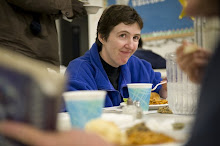First impressions of New Orleans
We're staying in what was St. Mary of the Angels Catholic school in the 9th Ward, until Katrina. (There are lots of abandoned schools around; literally half of the city hasn't come back after they were evacuated, 19 months ago.) We sleep on cots in the classrooms; the room where our group sleeps currently hosts 18 people.
The shower (there are 4, but two don't have hot water) is a contraption involving propane tanks and PVC pipes. You get the temperature you get; you can't adjust it. Dishes are washed in tubs with soap and bleach, but still manage to feel greasy all the time. We can wash our hands to our hearts’ content, and are encouraged to, but there is nothing to dry them on.
They ask us to work three shifts here, as well as 40 hours/week at our placements. I pulled a security shift from 3-9 this morning. I was on the third floor, where long-term volunteers sleep. During the night, someone tried to break into the refrigerated truck out back, holding our food.
Urban camping is more of a challenge than I was ready for. But the conditions here are not very different from some other places in the neighborhood.
Judy, Vivian, and I worked in a women's shelter yesterday; an average-size house that 17 people call home. I don't know how they do it. I talked for a long time with a cargo worker from the Port of New Orleans, who is staying in the shelter because her second house since Katrina was condemned two weeks ago. She's tried twice to leave, and got sent back by her union (or so I understand). She says that because she’s from New Orleans, she’s having a terrible time finding work at other ports. The city’s reputation for violent crime precedes her wherever she goes. I asked her, “What do you want me to say about New Orleans when I get home?” Her answer: “Get the troops out of Iraq, and bring them here. This is a war zone.”
She was essentially calling for martial law. I am very uncomfortable with that entire idea—but this is not my city, not my home. I don’t have the right to make decisions about what happens here. I can use my voice to amplify the voices of the people who live here; that is what I am doing.
I went to get a glass of water, and the "cold" tap didn't work—but the "hot" only had cold water running out of it. I was told that one of the bathrooms only had hot water. The residents only use the upstairs toilet, because the downstairs one doesn't work. Someone said that's typical; there's sea water underneath the city, messing with the pipes. They can't fix it, because there's not enough money to do that kind of work in the city.
We three will be back at the shelter tomorrow; they want me at 7 a. m. to ride with people on the bus to the walk-in clinic that opens at 8. Apparently it's a 15-minute bus ride, but the buses come at odd intervals that nobody can figure out. There are not enough mechanics to fix them when they break down, which is often, on these pothole-covered streets. They come when they can. And last time, 30 people waited in line for the clinic to open; only the first 9 were seen.
Michael, the only one in our group who's been here before, took us to Café du Monde for beignets last night. It was a bustling, happy place, full of sugar and laughter. We walked around the Quarter for awhile, wandering into shops, looking at monuments, feeling the history. It was busy, brightly lit, and filled with other gawkers just like us. They were filming a TV pilot in the park. That's one of the strange things about this: working in a disaster area, and then going out to a different neighborhood, playing tourist, having fun.
My task today is to begin telling as many people as I can, what is happening here. I'll upload pictures later.





No comments:
Post a Comment